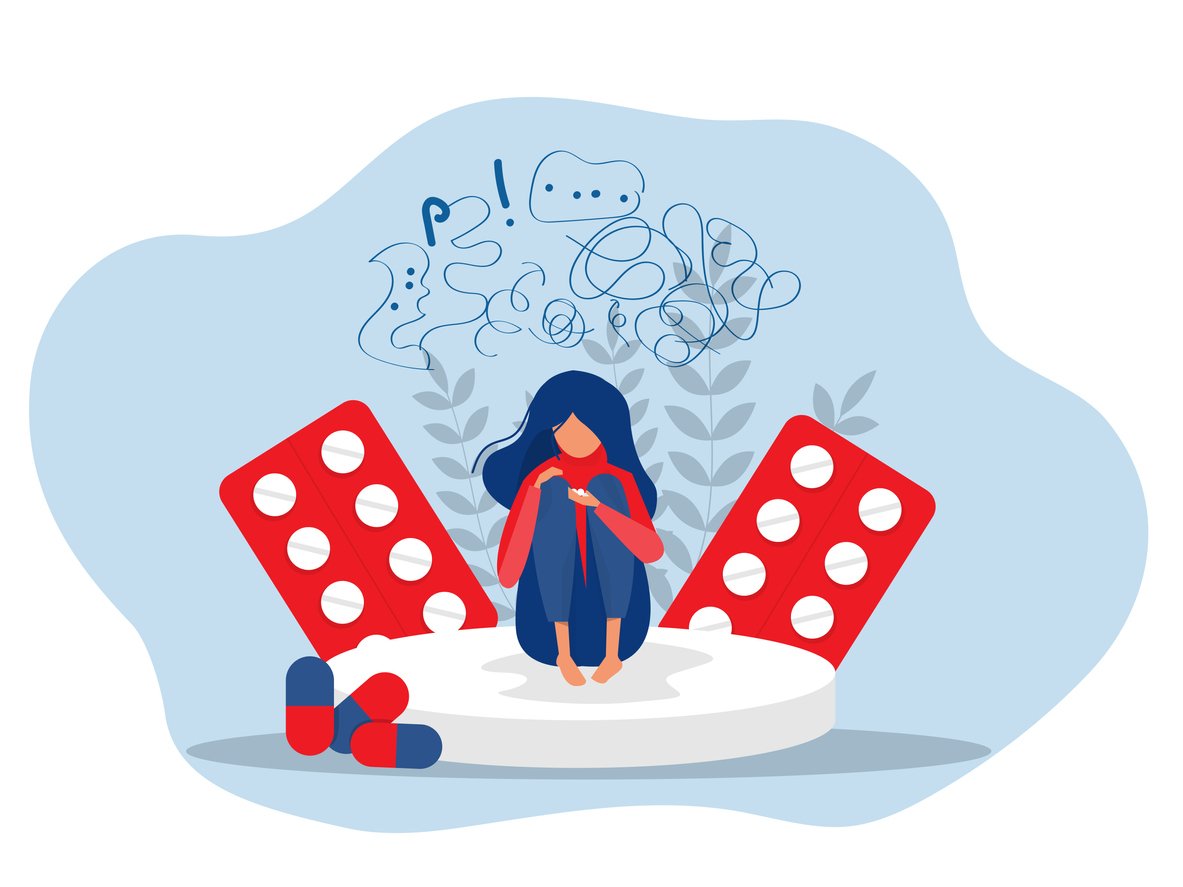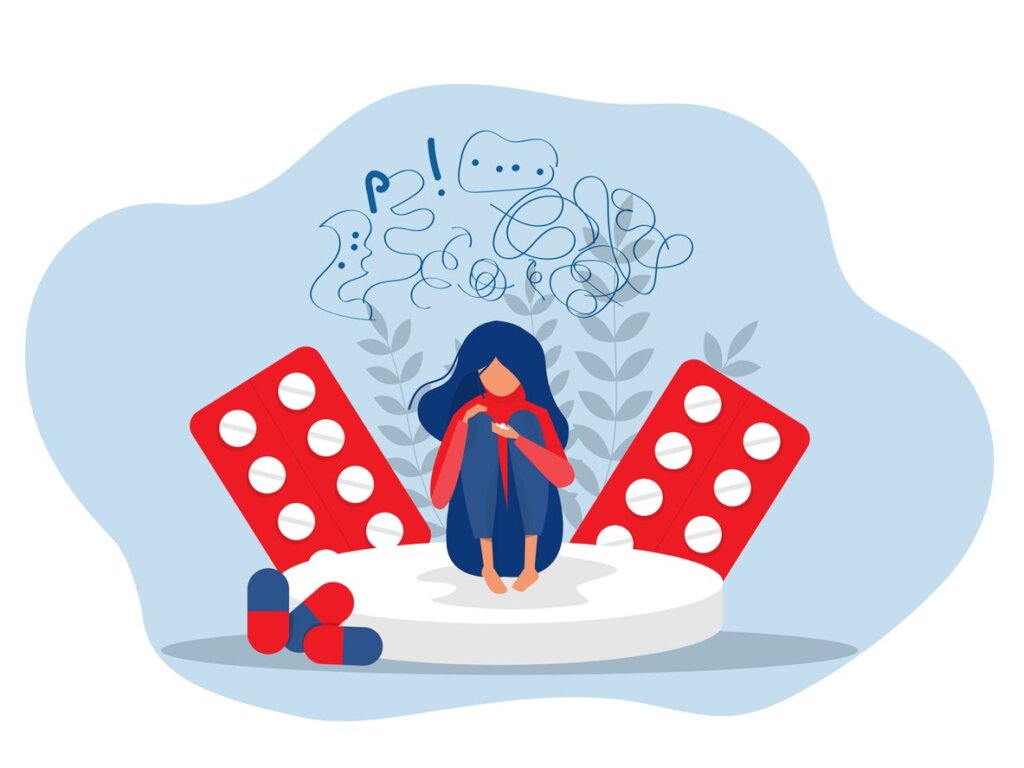

Antidepressants are a group of medications used to treat depression and several other mental health conditions. They work by changing the balance of certain chemicals in the brain, which can help improve mood and reduce symptoms of depression such as low energy levels, difficulty sleeping, poor concentration, and feelings of hopelessness.
Among the various types of antidepressants, many people can find a medication regimen that effectively treats their depression. Nonetheless, it is important to understand how antidepressants work and what side effects they can have when deciding on the best treatment option for you.
What are antidepressants?
Antidepressants are medications used for depression treatment and certain other mental health conditions. They work by regulating the levels of neurotransmitters, chemicals in the brain that enable brain cells to communicate with each other. These neurotransmitters, such as serotonin, norepinephrine, and dopamine, play a key role in regulating mood and emotions. There are several different types of antidepressants, which are classified based on their chemical structure and how they work.
SSRIs
SSRIs (selective serotonin reuptake inhibitors) are the most commonly prescribed antidepressants and work by increasing the levels of serotonin in the brain. Serotonin is a neurotransmitter that helps regulate mood, appetite, sleep, and social behavior. An imbalance of serotonin may contribute to anxiety, depression, and obsessive-compulsive behaviors. SSRIs can help alleviate these symptoms and improve mood. Common SSRIs include fluoxetine (Prozac), sertraline (Zoloft), escitalopram (Lexapro), paroxetine (Paxil), and citalopram (Celexa).
SNRIs
SNRIs, or serotonin-norepinephrine reuptake inhibitors, are antidepressants that work by increasing the levels of both serotonin and norepinephrine in the brain. Norepinephrine is a neurotransmitter that plays a role in alertness, sleep regulation, attention span, memory, and mood regulation. Low levels of norepinephrine can contribute to difficulty concentrating and symptoms of depression. SNRIs may help improve these symptoms by increasing both norepinephrine and serotonin levels in the brain. Common SNRIs include duloxetine (Cymbalta) and venlafaxine (Effexor).
Other Antidepressants
While SSRIs and SNRIs are the most commonly prescribed antidepressants, there are several other types of antidepressants that work in different ways. For example, bupropion (Wellbutrin) is an antidepressant medication that increases the levels of norepinephrine and dopamine in the brain. Mirtazapine (Remeron) increases the levels of norepinephrine and serotonin. Tricyclic antidepressants and monoamine oxidase inhibitors are other classes of antidepressants, although these are less frequently used due to their side effect profiles.
Finding the Right Medication
SSRIs, SNRIs, and other antidepressants can all help to regulate mood in different ways. Selecting the right antidepressant for you is an individualized process that takes time and patience. Many of these medications may take several weeks to reach their full effect. Some individuals do not experience improvement in their depression from a particular medication and may need to adjust the dose or switch to a different medication. In addition, some people may experience side effects, which can vary across different types of antidepressants. If you find yourself in either of these situations, do not lose hope! Many people will require multiple trials of different medications and doses to find the most effective treatment for them. This can also be a sign of treatment-resistant depression.
The best way to determine which antidepressants are right for you is to talk to your Geode provider. They can help you assess the severity of your symptoms, explain the potential benefits and side effects of different antidepressants, and provide personalized guidance on choosing a medication that is most likely to be effective for you.
What are the side effects of antidepressants?
Antidepressants are generally well-tolerated, but like all medications, they can have side effects. Common side effects include headache, gastrointestinal upset, insomnia, weight gain or loss, and sexual dysfunction. Some of these side effects may resolve over the first few weeks of treatment. In rare cases, antidepressants can cause more serious side effects, such as an increased risk of suicide. If you experience any of these symptoms while taking antidepressants, it is important to speak with your Geode provider right away.
Different types of antidepressants can also have different side effect profiles. For example, SNRIs are more likely than SSRIs to have anxiety and increased blood pressure as side effects. Bupropion may have a lower risk of sexual side effects. Everyone responds to medication differently; it is important to consult with your provider before starting any medication or making dose adjustments.
How do I know if I need antidepressants?
Ultimately, the decision to take antidepressants is personal and should be based on an individual’s specific needs and goals. Some people with depression choose to manage their symptoms through ongoing talk therapy and lifestyle changes, such as exercising, eating a balanced diet, and getting enough sleep. Other individuals benefit from antidepressants, which are often used in conjunction with psychotherapy, such as supportive psychotherapy or psychodynamic psychotherapy, and lifestyle changes.
Your Geode provider can help you understand your options and discuss the potential risks and benefits of antidepressants. They can also provide guidance on lifestyle changes and other treatments that may be beneficial for managing depression. If you’re wondering “is therapy covered by insurance,” your provider can also walk you through your mental health benefits and help you explore available options.
Antidepressants, often used in conjunction with talk therapy, can be an effective treatment for depression. Your Geode provider can provide personalized care and support to help you manage your symptoms and work toward a healthier, happier life. To get started on the road to recovery, find a Geode provider near you today.
Improve your mental and emotional wellness with Geode Health’s personalized therapy sessions, available at multiple locations across Georgia, Illinois, North Carolina, and Texas, ensuring accessibility for individuals and couples.
Whether you’re searching for a therapist in Fort Worth or psychiatrist in Athens, GA, know that we’re here to help you throughout your journey.


